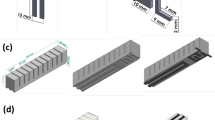Abstract
One approach to realize more life-like soft robots is the use of pneumatically contracting structures, acting as muscles. Fabricating such systems usually requires manual assembly or molding steps, which extend the time between designing and testing of a new concept. In order to streamline rapid prototyping this study used a multi-material FDM 3D printer for producing a simplified robotic arm with an integrated pneumatic muscle. The actuator working as a pneumatic bicep is printed from thermoplastic polyurethane with a shore hardness of A70, while the arm itself is made of rigid polylactic acid. During the printing process the muscle is, while being printed itself, embedded into the arm by a physical joint, through which the arm assembly can change its angle according to the actuation. In this work, we describe the challenges appearing in such a combined processing of two different materials and how they are addressed. Through its design the resulting soft robotic arm is printed without the need of any support material inside its hollow structures and is ready for testing right after the printing finished. By applying negative pressure to the actuator’s inlet, the arm was able to lift up to 270 g load.
Access this chapter
Tax calculation will be finalised at checkout
Purchases are for personal use only
Similar content being viewed by others
References
Abidi, H., Cianchetti, M.: On intrinsic safety of soft robots. Front Robot AI 4, 6 (2017). https://doi.org/10.3389/frobt.2017.00005
Rus, D., Tolley, M.T.: Design, fabrication and control of soft robots. Nature 521, 467–475 (2015). https://doi.org/10.1038/nature14543
Mazzolai, B., et al.: Roadmap on soft robotics: multifunctionality, adaptability and growth without borders. Multifunct. Mater. 5, 032001 (2022). https://doi.org/10.1088/2399-7532/ac4c95
Whitesides, G.M.: Soft robotics. Angew. Chem. Int. Ed. 57, 4258–4273 (2018). https://doi.org/10.1002/anie.201800907
Yang, D., et al.: Buckling pneumatic linear actuators inspired by muscle. Adv. Mater. Technol. 1, 1600055 (2016). https://doi.org/10.1002/admt.201600055
Conrad, S., Speck, T., Tauber, F.: Multi-material 3D-printer for rapid prototyping of bio-inspired soft robotic elements. In: Vouloutsi, V., Mura, A., Tauber, F., Speck, T., Prescott, T.J., Verschure, P.F.M.J. (eds.) Biomimetic and Biohybrid Systems: 9th International Conference, Living Machines 2020, Freiburg, Germany, July 28–30, 2020, Proceedings, pp. 46–54. Springer International Publishing, Cham (2020). https://doi.org/10.1007/978-3-030-64313-3_6
Conrad, S., Speck, T., Tauber, F.J.: Tool changing 3D printer for rapid prototyping of advanced soft robotic elements. Bioinspir. Biomim. 16, 55010 (2021). https://doi.org/10.1088/1748-3190/ac095a
Funding
Funded by the Deutsche Forschungsgemeinschaft (DFG, German Research Foundation) under Germany’s Excellence Strategy – EXC-2193/1-390951807.
Author information
Authors and Affiliations
Corresponding author
Editor information
Editors and Affiliations
Rights and permissions
Copyright information
© 2022 The Author(s), under exclusive license to Springer Nature Switzerland AG
About this paper
Cite this paper
Conrad, S., Speck, T., Tauber, F.J. (2022). Multi-material FDM 3D Printed Arm with Integrated Pneumatic Actuator. In: Hunt, A., et al. Biomimetic and Biohybrid Systems. Living Machines 2022. Lecture Notes in Computer Science(), vol 13548. Springer, Cham. https://doi.org/10.1007/978-3-031-20470-8_3
Download citation
DOI: https://doi.org/10.1007/978-3-031-20470-8_3
Published:
Publisher Name: Springer, Cham
Print ISBN: 978-3-031-20469-2
Online ISBN: 978-3-031-20470-8
eBook Packages: Computer ScienceComputer Science (R0)




